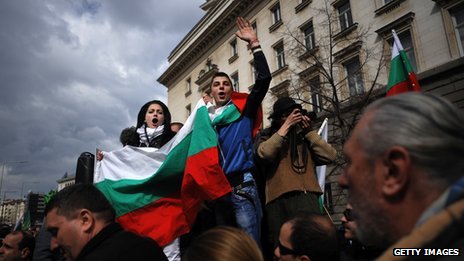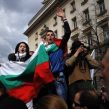
Fresh Protests Threaten to Follow Bulgarian Parliamentary Election
Publication: Eurasia Daily Monitor Volume: 10 Issue: 89
By:

Parliamentary elections in Bulgaria on May 12 are unlikely to ease tensions after weeks of public protests against poverty and corruption brought the government down in February. Nor will the vote open the way for economic reform to increase growth and improve living standards in the poorest EU member state. Instead, the country may face a political stalemate with none of the contenders able to win a clear majority to form a government. In addition, coalitions will be extremely difficult to form with animosities running high among the four parties slated to pass the four percent threshold.
To further complicate the situation, consultations on forming a government may not even begin as a new wave of protests is expected to start as soon as the polling stations close on Sunday. Activists have already announced they will take to the streets if the former ruling party Citizens for European Development of Bulgaria (GERB), which resigned from power in February, wins the election. Pollsters have warned that the Sunday election could lead to more political turmoil, becoming the prelude to another early vote (bTV; inews.bg, May 9; novinite.com, May 10).
According to economist Georgi Ganev in Sofia, if Bulgaria is unable to form a government, the sense of economic insecurity will dramatically increase. It will first result in a hike of interest rates to insure protection for the banks. Second, planned foreign investment projects will be suspended, postponed, or cancelled. As a result, the labor market will not be able to recover, directly affecting the lives of half a million Bulgarians (Pressa Daily, April 15).
The winter unrest in more than 15 major cities started as a protest against the rising energy prices, but quickly evolved into public outrage with poverty, corruption, business monopolies, and the entire political system. Mistrust in government institutions led to radical demands such as expelling foreign electricity distributors, dismantling all political parties, allowing only non-partisan candidates to run for parliament, and introducing civil society oversight over all government institutions (for more details see EDM, February 15, March 8).
In a tragic development, Bulgaria witnessed a number of public self-immolations that are not typical for the country. Seven people set themselves on fire to protest poverty and the existence of mafia-style gangs. Six of them died, including activist Plamen Goranov, who set himself ablaze in front of Varna’s City Hall and became the heroic image of the protests. The unrest only subsided after President Rosen Plevneliev appointed an interim government to prepare for early elections.
The political parties, however, failed to run clean election campaigns, resorting to mutual mudslinging and personal attacks. Two weeks before the elections a major wiretapping scandal shook the public. In one of the leaked conversations, former Prime Minister Boyko Borisov, former Agriculture Minister Miroslav Naydenov, and Sofia City Prosecutor Nikolay Kokinov could be heard discussing options for obstructing legal proceedings against Naydenov who faces charges of corruption. Kokinov was forced to resign after the revelation. The uncovering of illegal government wiretapping could make the public more hesitant to participate in the elections. According to the National Center for the Study of Public Opinion the turnout on Sunday is expected to be 55 percent (Capital Daily, BTN, novinite.com; April 26; Dnevnik, May 9).
The latest opinion polls show that GERB, the former ruling party, is leading by only 2-5 percent ahead of the Bulgarian Socialist Party (BSP). According to a survey by the Center for Marketing and Analysis, GERB will receive 21.3 percent of votes, while the Bulgarian Socialist Party (BSP) will score 18.9 percent. Alpha Research forecasts 33 percent for GERB and 28 percent for BSP. None of the two parties is likely to have enough seats to form a government without a coalition partner (Capital Daily; Trud; novinite.com, May 9).
GERB is a populist party that has tried to adopt a center-right appeal, but lacks a credible ideological platform. The GERB government was largely inconsistent in its policies and failed to curb corruption and unemployment. The party has relied mostly on the macho image of its leader and former Prime Minister Boyko Borisov, who in the 1990s served as a bodyguard for communist dictator Todor Zhivkov.
GERB’s rival BSP was seriously discredited for misappropriating EU funds during the 2005-2009 government of its leader Sergey Stanishev. The EU Commission had to suspend some of the funding for Bulgaria until the next government of Borisov addressed procurement problems.
The two smaller parties that would make it to parliament are the Movement for Rights and Freedoms (MRF), representing mostly Bulgaria’s Turks (7-10 percent), and the ultra-nationalist Ataka, which took advantage of the anti-government protests last winter (5-7 percent). While BSP is a traditional coalition partner of the Turkish party, GERB may have lost the support of its ally Ataka, which was very vocal during the anti-government protests in February-March. It is unclear whether the new liberal Bulgaria for Citizens Movement of former EU Commissioner Meglena Kuneva would pass the four percent threshold, but if it does, the party can become the kingmaker in the government (novinite.com, May 10).
Several opposition parties have voiced concerns that GERB may rig the elections in an attempt to gain a majority in parliament (novinite, May 9). In an unprecedented move, all the major political parties, except GERB, have teamed up to organize a parallel ballot count for the elections. The “election fairness” coalition includes leftists, rightists, nationalists, and liberals, including the Democrats for a Strong Bulgaria led by former Prime Minister Ivan Kostov (1997-2001) (BGNES, May 7; novinite.com, May 9).




